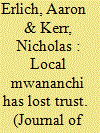|
|
|
Sort Order |
|
|
|
Items / Page
|
|
|
|
|
|
|
| Srl | Item |
| 1 |
ID:
141646


|
|
|
|
|
| Summary/Abstract |
Why do political actors undertake reforms that constrain their own discretion? We argue that uncertainty generated by political competition is a major driver of such reforms, and test this argument using subnational data on Mexican states’ adoption of state-level access to information (ATI) laws. Examining data from 31 Mexican states plus the Federal District, we find that more politically competitive states passed ATI laws more rapidly, even taking into account the party in power, levels of corruption, civil society, and other factors. The fine-grained nature of our data, reflecting the staggered timing of elections, inauguration dates, and dates of passage, allows us to distinguish between different theoretical mechanisms. We find the greatest evidence in favor of an insurance mechanism, by which incumbent parties who face uncertainty over future political control seek to ensure access to government information, and means of monitoring incumbents, in the future in case they lose power.
|
|
|
|
|
|
|
|
|
|
|
|
|
|
|
|
| 2 |
ID:
148950


|
|
|
|
|
| Summary/Abstract |
Across African democracies, maintaining popular trust in electoral management bodies (EMBs) is vital to enhancing election integrity and, ultimately, regime legitimacy. However, scholars have largely sidestepped any systematic analysis of how citizens formulate their attitudes towards EMBs and how these attitudes vary over time. To address these gaps in the literature, we focus on Kenyan EMBs, which have experienced fluctuating popular support since the ruinous 2007 elections and subsequent institutional reforms. Using primary election reports and original survey and focus group data, we analyse the sources of Kenyans' trust in EMBs from 1992 onward and probe the 2013 election period deeply. Across time, we find that confidence in EMBs usually collapses after polarised elections, due to perceived problems with the EMB's autonomy and capacity. Following the 2013 elections, Kenyans were also more likely to lose confidence in the EMB if they were affiliated with losing presidential candidates or if they were critical of EMB performance.
|
|
|
|
|
|
|
|
|
|
|
|
|
|
|
|
|
|
|
|
|